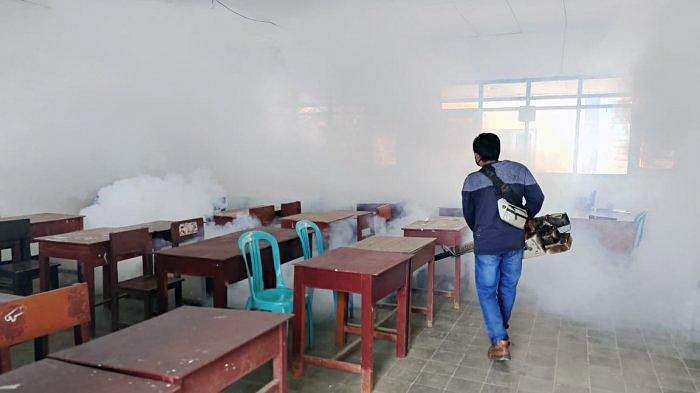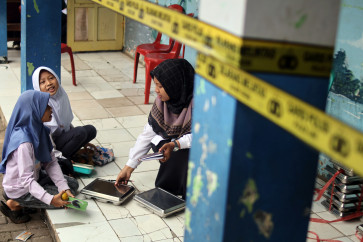Popular Reads
Top Results
Can't find what you're looking for?
View all search resultsPopular Reads
Top Results
Can't find what you're looking for?
View all search resultsLeave no one behind in malaria elimination
Indonesia's disparity in malaria burden underscores the urgent need to reinvigorate the fight, especially in the most difficult-to-reach area.
Change text size
Gift Premium Articles
to Anyone
M
alaria, a mosquito-borne infectious disease, continues to cast a long shadow over Indonesia. Despite the nation's impressive strides toward elimination, malaria remains a significant public health threat in Indonesia.
While almost 75 percent of the regencies/cities are certified as malaria-free, the burden falls unevenly across the archipelago.
According to data from the Health Ministry’s Malaria Unit, as of 2023, a remarkable 389 regencies and cities had achieved malaria-free certification. This impressive progress includes five provinces – Jakarta, Bali, West Java, East Java and Banten – where all districts have successfully eliminated malaria entirely. On the contrary, the islands of Papua, Sumba Island in East Nusa Tenggara and North Penajam Paser regency in East Kalimantan, which hosts the new capital of Nusantara, continue to bear a disproportionately high burden of malaria.
Papua alone accounts for 90 percent of malaria cases reported in Indonesia. This disparity in progress can be attributed to several factors.
Delivering essential healthcare services and supplies remains a persistent challenge due to geographic isolation and logistical barriers. Difficult terrain, limited transportation infrastructure and severe weather conditions severely hinder access to testing, treatment and preventative measures.
The community's perception of the disease adds another layer of complexity, contributing to suboptimal services that worsen health outcomes for malaria patients. Moreover, this region often has poorer overall health profiles, with a significant burden of other diseases such as HIV, tuberculosis and malnutrition.
Indonesia's disparity in the malaria burden underscores the urgent need to reinvigorate the fight, especially in the most difficult-to-reach areas that have the highest transmission rates and disease burden. Before we can speak of elimination, to rapidly bring down the burden of disease, a relentless, laser focus on detection, prompt diagnosis through rapid diagnostics and treatment is critical.
We must also recognize the vital role that community and village-level health workers play, particularly in case detection. Once modest levels of control have been realized in these high-burden pockets, we can look to further tailored, community-based solutions that leverage the best of both proven interventions such as bed nets as well as applicable new tools such as novel vector control methods or vaccines.
Achieving this goal will require strong leadership and consistent political will, both at the national and local levels. This involves prioritizing resources for high-burden areas and empowering local administration to take charge of their health outcomes through community-based solutions and local leadership in malaria control efforts.
Indonesia marked World Malaria Day on June 24, 2024, under the theme Accelerating the fight against malaria for a more equitable world. As part of the commemoration, 17 new regencies received malaria-free certification, and a high-level meeting was convened by the Health Ministry in Jakarta, to gather heads from 14 high-burden regions of Papua. This high-level meeting brought together leaders from the national and local levels, experts and international partners, aimed to join forces and intensify to eliminate malaria in the Papua region.
The fight, however, extends beyond national borders. Recognizing that malaria elimination requires a regional effort, Indonesia participated in the Eighth Asia Pacific Leaders' Summit on Malaria Elimination on June 6 in Port Moresby.
In the summit, we joined Papua New Guinea, Solomon Islands, Timor-Leste and Vanuatu in signing the Eliminating Malaria and other Vector Borne Diseases through Enhanced Regional Partnerships (EDEN) Initiative – a regional collaboration focused on integrated vector-borne disease control.
This initiative tackles malaria and other vector-borne diseases through a collaborative approach, aiming to share resources and expertise across borders to bridge the gap in progress between high-burden and low-burden areas throughout the Asia Pacific region.
Malaria elimination in Indonesia requires thinking outside the box and with a sense of urgency. Lost time is lost lives.
This is particularly true for efforts in Papua and across the borders. Eliminating malaria by 2030 advances Indonesia’s broader development goals, including the vision of a golden generation.
This year’s World Malaria Day highlights a fundamental reality: placing the well-being of vulnerable communities at the forefront is essential not only for eliminating malaria but also for creating a fairer and healthier future for all Indonesians, ensuring no one is left behind.
***
Dante Saksono Harbuwono is Indonesia's deputy health minister. Sarthak Das is chief executive officer of Asia Pacific Leaders Malaria Alliance (APLMA).











